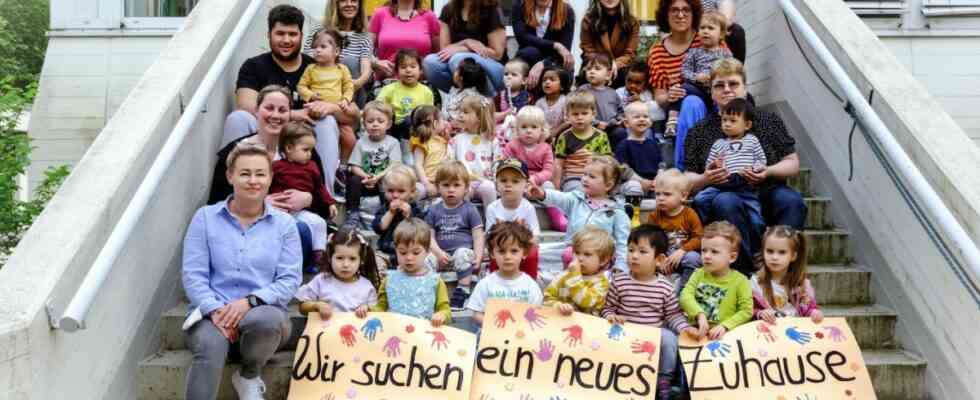One family drives five kilometers from Haidhausen to Harlaching every day to take the child to kindergarten. The other has a new apartment in Steinhausen and commutes to Sendling to see the childminder. Despite the water damage, limited opening hours and the steep Tierparkberg, the third set of parents travels daily from Harlaching to the crèche in Thalkirchen. Taking stock of the circle of acquaintances shows that anyone who has found a place for day care in Munich is not going to give it up that easily. But what about those who are still looking for the start of the new daycare year on September 1st? What challenges are the facilities facing – and what do you think of the Social Affairs Minister’s proposal to fill the need for staff with less qualified workers?
There are 1,450 day-care centers in Munich, operated by denominational sponsors, private companies and non-profit organizations, among others. The city itself maintains 450 facilities with places for around 38,000 crèche, kindergarten and after-school care children. There are also numerous childminders and childminders. As of the spring deadline, more than 30,000 childcare places can be allocated each year. That sounds like a lot, but it’s still not enough.
According to the Statistical Office, 92,272 children between the ages of one and five lived in Munich in July 2022, compared to a good 500 fewer the year before. According to the Department for Education and Sport (RBS), the level of coverage for one to three-year-olds was 72 percent in September 2021; more recent data is not available. For three to six year olds it was 96 percent. This means that the city council’s target of 60 percent in the crèche area has been reached, but not yet 100 percent in the kindergarten area.
Many parents probably registered their children later because of Corona
That’s why the notices on the playgrounds and the requests on the Internet accumulate in autumn. “I’m totally desperate about this whole kindergarten situation,” writes the mother of a four-year-old from Allach-Untermenzing in a local Facebook group. She has been searching for a year without success, although she has contacted more than 20 institutions. This may also be due to the fact that the district has the worst number of kindergarten places in comparison to the rest of the city.
The city does not know how many families feel the same way. No evaluation takes place via the Kita-Finder, the central allocation software. “But this would not be meaningful anyway, since commitments and registrations are also made outside of the daycare center finder,” says RBS spokesman Andreas Haas. But the city assumes that there will be an increased need for crèche places this year. Currently, many parents would report to the municipal counseling center. Assume, says Haas, “that many parents only registered their small children for daycare this year due to the corona hygiene measures last year”. Because there is a lack of staff, this is a challenge.
The natural kindergarten in Bogenhausen is also struggling with this. The parent-child initiative, which is based in a trailer in Pühnpark, has existed for almost 20 years. Now the club is threatened with closure because one supervisor is retiring and another has quit. “Now the children are getting active,” says board member Lukas Hugo. “They make posters and hang them up in the neighborhood.”
A push from the Bavarian Ministry of Social Affairs could help the association. At the end of August, Minister Ulrike Scharf (CSU) suggested that the municipalities and independent daycare providers should make use of the experimentation clause in the Child Education and Care Act. In contrast to the classic day-care center, 15 children can now be cared for by less qualified staff in so-called mini-daycare centers instead of the previous 12.
Instead of lowering standards, more study places should be created
According to RBS, 20 such small daycare centers have been set up in Munich since 2020/2021. However, the city itself is still clarifying whether and how such concepts could be implemented. The free carriers are also reluctant to respond. There shouldn’t be any “two-class day care”, says Alexa Glawogger-Feucht, managing director of the Association of Catholic Day Care Centers in Bavaria. Before lowering the standards, one should rather create more pedagogical study places or offer state subsidies for further education.
The Kreisjungendring München-Stadt (KJR) is missing 20 educators and nannies. Filling the vacancies is a challenge, but there is another problem: “For larger groups, larger rooms are needed – which are not available,” says spokeswoman Angelika Baumgart-Jena.
Clare Nagrauft is also looking for rooms. She is the managing director of the Klausenburg day care center in Zamdorf. The office building that houses the crèche is scheduled for demolition in early 2024. If no suitable property can be found by then, the facility must close. “It’s for milking mice: we hired realtors, contacted the city and local politics, but we can’t find anything!”
If the association had more space, it could also offer a kindergarten group. “We have a good reputation and, despite the lack of educators, long-standing permanent staff,” says Nagrauft. The crèche is a functioning unit, a closure would also be a loss for Bogenhausen – at the moment there is not even a crèche place for every second toddler.

